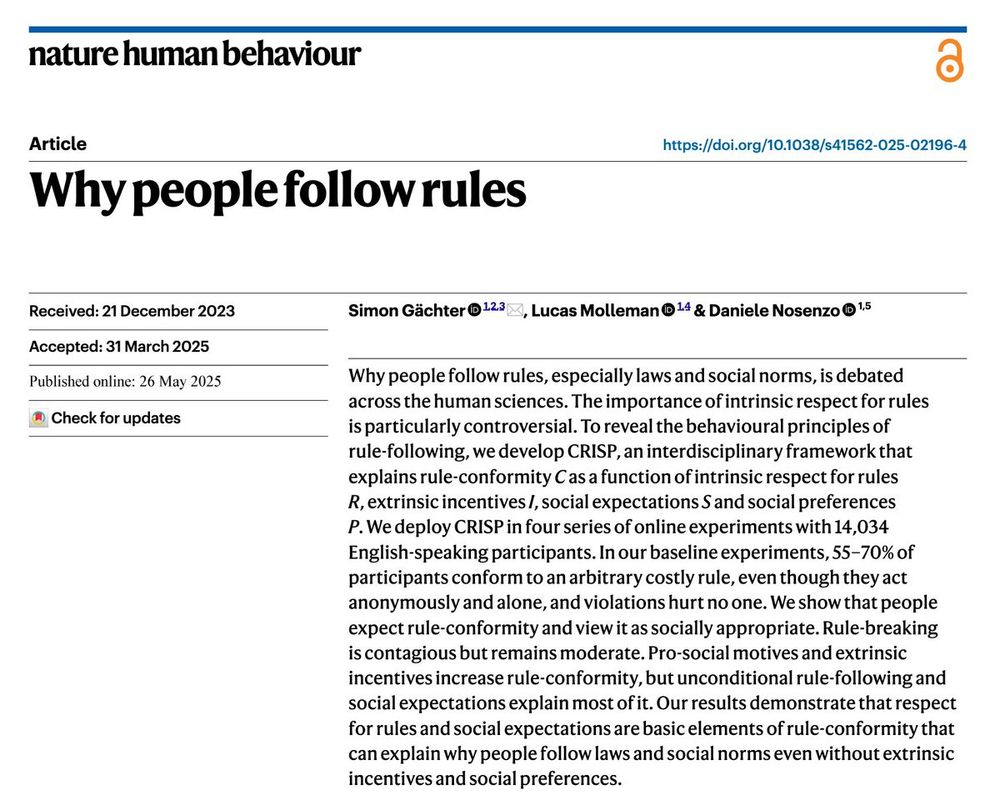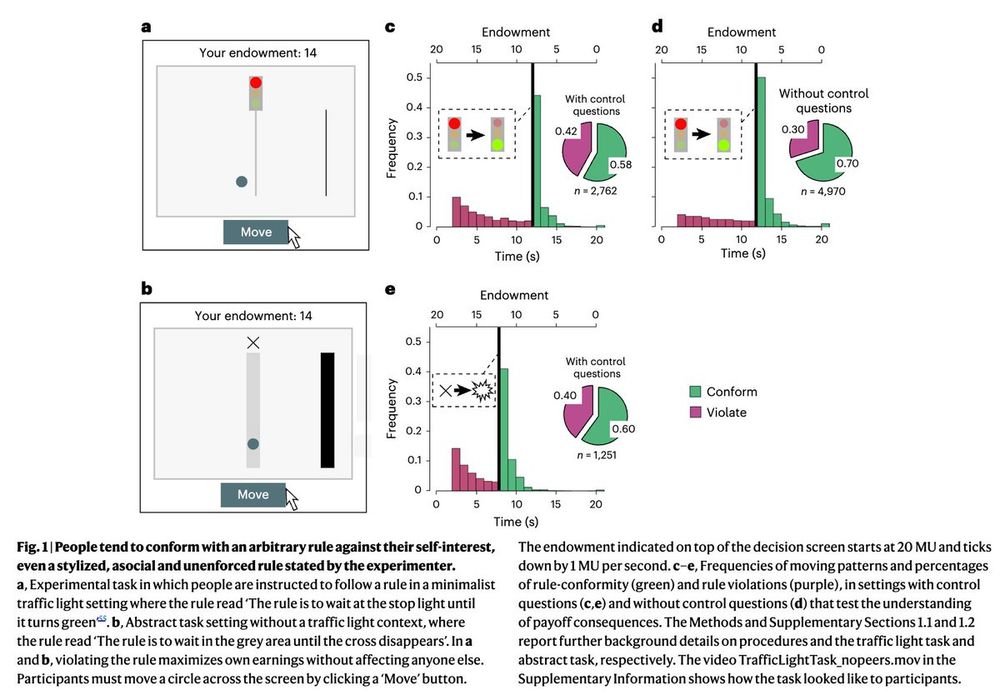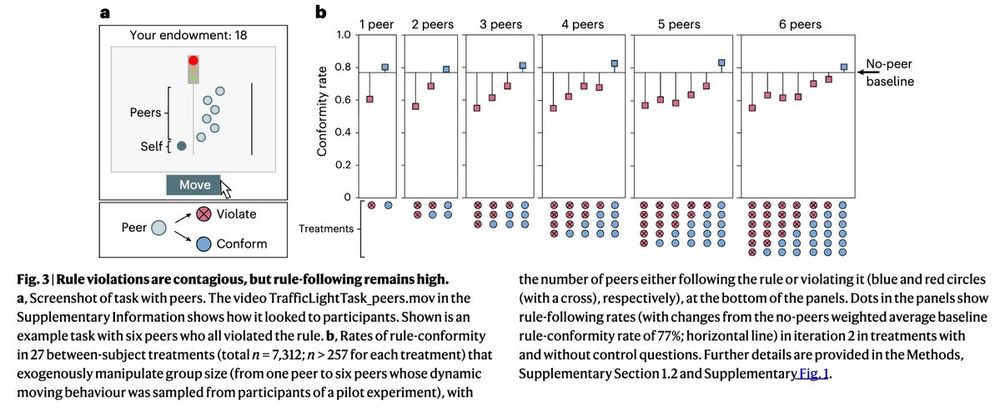
CeDEx University of Nottingham
@uoncedex.bsky.social
Experimental Economics and Behavioural Science news from the Centre for Decision Research and Experimental Economics at the University of Nottingham, UK. https://www.nottingham.ac.uk/cedex/
Pinned
Welcome to CeDEx - The University of Nottingham
www.nottingham.ac.uk
This year CeDEx marks its 25th anniversary. To celebrate, we are designating this year’s seminar series the 'CeDEx 25th Anniversary Series'. It will include speakers with longstanding connections to CeDEx, with first talk by Prof. Robert Sugden (UEA) on 19th Feb. Further info: tinyurl.com/txscbm4h
Wed 5th November will see our very own Simon Gaechter give the latest talk in our @uoncedex.bsky.social 25th anniversary seminar series. The event will take place in @uoneconomics.bsky.social A40 Sir Clive Granger Building 1-2pm. About Simon: tinyurl.com/yd5mbttp Our Seminars: tinyurl.com/mr448tuv

November 3, 2025 at 11:07 AM
Wed 5th November will see our very own Simon Gaechter give the latest talk in our @uoncedex.bsky.social 25th anniversary seminar series. The event will take place in @uoneconomics.bsky.social A40 Sir Clive Granger Building 1-2pm. About Simon: tinyurl.com/yd5mbttp Our Seminars: tinyurl.com/mr448tuv
Tomorrow 29th Oct Björn Bartling (@econ.uzh.ch) will join us as our latest @uoncedex.bsky.social 25th anniversary seminar series speaker. Talk will be in @uoneconomics.bsky.social Sir Clive Granger Building A40 1-2pm. About Björn: tinyurl.com/z8sujs2p More about our seminars: tinyurl.com/297k52mf

October 28, 2025 at 12:31 PM
Tomorrow 29th Oct Björn Bartling (@econ.uzh.ch) will join us as our latest @uoncedex.bsky.social 25th anniversary seminar series speaker. Talk will be in @uoneconomics.bsky.social Sir Clive Granger Building A40 1-2pm. About Björn: tinyurl.com/z8sujs2p More about our seminars: tinyurl.com/297k52mf
Tomorrow - 15th October - Vanessa Valero of @imt.fr Business School will join us as @uoncedex.bsky.social latest seminar speaker. The talk will take place in @uoneconomics.bsky.social Sir Clive Granger Building A40 1-2pm. More about Vanessa: tinyurl.com/ykmn2aah Our seminars: tinyurl.com/5admsv9t

October 14, 2025 at 9:25 AM
Tomorrow - 15th October - Vanessa Valero of @imt.fr Business School will join us as @uoncedex.bsky.social latest seminar speaker. The talk will take place in @uoneconomics.bsky.social Sir Clive Granger Building A40 1-2pm. More about Vanessa: tinyurl.com/ykmn2aah Our seminars: tinyurl.com/5admsv9t
The CeDEx 25th anniversary seminar series continues today as we welcome Benedikt Herrmann (Research Centre at European Commission). The talk will take place in @uoneconomics.bsky.social A40 Sir Clive Granger Building, 1-2pm. More about our seminars here: www.nottingham.ac.uk/cedex/semina...

October 8, 2025 at 9:51 AM
The CeDEx 25th anniversary seminar series continues today as we welcome Benedikt Herrmann (Research Centre at European Commission). The talk will take place in @uoneconomics.bsky.social A40 Sir Clive Granger Building, 1-2pm. More about our seminars here: www.nottingham.ac.uk/cedex/semina...
New publication by Cristina Bicchieri and current & former @UoNCeDEx res Simon Gaechter, @lucasmolleman.bsky.social and Daniele Nosenzo on the role of group identity (ingroup vs outgroup) for rule following: doi.org/10.1016/j.je...
Redirecting
doi.org
October 1, 2025 at 6:23 PM
New publication by Cristina Bicchieri and current & former @UoNCeDEx res Simon Gaechter, @lucasmolleman.bsky.social and Daniele Nosenzo on the role of group identity (ingroup vs outgroup) for rule following: doi.org/10.1016/j.je...
A crisp summary by MORETHANNOW for Substack of our paper Why people follow rules: Why do people follow rules? open.substack.com/pub/morethan...

Why do people follow rules?
There are many rules in organisations that are in place to prevent harm and create harmonious cooperation. So how do we help make sure employees follow rules?
open.substack.com
September 22, 2025 at 12:34 PM
A crisp summary by MORETHANNOW for Substack of our paper Why people follow rules: Why do people follow rules? open.substack.com/pub/morethan...
Very interesting cross-cultural research including former @uoncedex.bsky.social researcher @jonathanschulz.bsky.social
A Registered Report of 7,978 people in 20 countries by @cmolho.bsky.social et al finds that decision-makers willfully ignore inconvenient information. Information about the negative consequences drives prosociality, especially among guilt-prone individuals.
www.nature.com/articles/s41...
www.nature.com/articles/s41...
Guilt drives prosociality across 20 countries - Nature Human Behaviour
This Registered Report of 7,978 people in 20 countries found that guilt and information about consequences drive prosocial behaviour. Guilt-prone individuals gave more when they were informed about th...
www.nature.com
August 12, 2025 at 3:14 PM
Very interesting cross-cultural research including former @uoncedex.bsky.social researcher @jonathanschulz.bsky.social
Our paper on Why people follow rules is now published in the July Issue of @nathumbehav.nature.com. Check it our here: doi.org/10.1038/s415...

Why people follow rules - Nature Human Behaviour
Why do people follow rules, even when breaking them has no consequences? Experiments with 14,034 participants reveal that rule-following is not just about rewards or punishments—it is driven by intrin...
doi.org
July 23, 2025 at 6:00 AM
Our paper on Why people follow rules is now published in the July Issue of @nathumbehav.nature.com. Check it our here: doi.org/10.1038/s415...
Reposted by CeDEx University of Nottingham
"people expect rule-conformity and view it as socially appropriate. Rule-breaking is contagious but remains moderate. Pro-social motives and extrinsic incentives increase rule-conformity, but unconditional rule-following and social expectations explain most of it."
www.nature.com/articles/s41...
www.nature.com/articles/s41...

Why people follow rules - Nature Human Behaviour
Why do people follow rules, even when breaking them has no consequences? Experiments with 14,034 participants reveal that rule-following is not just about rewards or punishments—it is driven by intrin...
www.nature.com
July 8, 2025 at 12:33 PM
"people expect rule-conformity and view it as socially appropriate. Rule-breaking is contagious but remains moderate. Pro-social motives and extrinsic incentives increase rule-conformity, but unconditional rule-following and social expectations explain most of it."
www.nature.com/articles/s41...
www.nature.com/articles/s41...
Interesting take on the @uoncedex.bsky.social study on why people follow rules: theboar.org/2025/06/one-....
The study is here: doi.org/10.1038/s415...
The study is here: doi.org/10.1038/s415...
The Boar
theboar.org
June 30, 2025 at 8:08 PM
Interesting take on the @uoncedex.bsky.social study on why people follow rules: theboar.org/2025/06/one-....
The study is here: doi.org/10.1038/s415...
The study is here: doi.org/10.1038/s415...
Interested in how performance incentives affect positive reciprocity?
Check out our most recent paper, now published in Experimental Economics: "Incentives crowd out voluntary cooperation: evidence from gift-exchange experiments", by Simon Gaechter, Esther Kaiser and Manfred Koenigstein.
Check out our most recent paper, now published in Experimental Economics: "Incentives crowd out voluntary cooperation: evidence from gift-exchange experiments", by Simon Gaechter, Esther Kaiser and Manfred Koenigstein.
Incentives crowd out voluntary cooperation: evidence from gift-exchange experiments | Experimental Economics | Cambridge Core
Incentives crowd out voluntary cooperation: evidence from gift-exchange experiments - Volume 28 Issue 1
www.cambridge.org
June 25, 2025 at 8:30 PM
Interested in how performance incentives affect positive reciprocity?
Check out our most recent paper, now published in Experimental Economics: "Incentives crowd out voluntary cooperation: evidence from gift-exchange experiments", by Simon Gaechter, Esther Kaiser and Manfred Koenigstein.
Check out our most recent paper, now published in Experimental Economics: "Incentives crowd out voluntary cooperation: evidence from gift-exchange experiments", by Simon Gaechter, Esther Kaiser and Manfred Koenigstein.
Article about our paper in @nathumbehav.nature.com Why people follow rules, now in this week's print edition of @newscientist.com : www.newscientist.com/issue/3547/ including a mention on the title page:

Issue #3547 | Magazine cover date: 14 June 2025
Read Issue #3547 14 June 2025 of New Scientist magazine for the latest news from across the world of science, plus long reads, opinion, analysis, and more
www.newscientist.com
June 12, 2025 at 7:48 PM
Article about our paper in @nathumbehav.nature.com Why people follow rules, now in this week's print edition of @newscientist.com : www.newscientist.com/issue/3547/ including a mention on the title page:
Reposted by CeDEx University of Nottingham
Why do people follow rules?
Sense of duty
To avoid punishments
Social expectations
Preferences
doi.org/10.1038/s415...
Sense of duty
To avoid punishments
Social expectations
Preferences
doi.org/10.1038/s415...

Why people follow rules - Nature Human Behaviour
Why do people follow rules, even when breaking them has no consequences? Experiments with 14,034 participants reveal that rule-following is not just about rewards or punishments—it is driven by intrin...
doi.org
June 8, 2025 at 10:33 AM
Why do people follow rules?
Sense of duty
To avoid punishments
Social expectations
Preferences
doi.org/10.1038/s415...
Sense of duty
To avoid punishments
Social expectations
Preferences
doi.org/10.1038/s415...
Nice article in @newscientist.com about our paper on why people follow rules: www.newscientist.com/article/2482...

Quarter of people follow rules even with no downside to breaking them
Why do we follow rules? A series of experiments with more than 14,000 people reveals that around a quarter of us will follow rules unconditionally, even if obeying them harms us and there is no downsi...
www.newscientist.com
June 6, 2025 at 9:07 AM
Nice article in @newscientist.com about our paper on why people follow rules: www.newscientist.com/article/2482...
A concise summary of our paper on Why people follow rules in Phys.org : Most people obey arbitrary rules even when it's not in their interest to do so, experiments show.
Read it here: phys.org/news/2025-06...
Read it here: phys.org/news/2025-06...
Phys.org - News and Articles on Science and Technology
Daily science news on research developments, technological breakthroughs and the latest scientific innovations
Phys.org
June 4, 2025 at 11:02 AM
A concise summary of our paper on Why people follow rules in Phys.org : Most people obey arbitrary rules even when it's not in their interest to do so, experiments show.
Read it here: phys.org/news/2025-06...
Read it here: phys.org/news/2025-06...
Reposted by CeDEx University of Nottingham
Why do we follow rules? A series of experiments with more than 14,000 people reveals that around a quarter of us will follow rules unconditionally, even if obeying them harms us and there is no downside to breaking them

Quarter of people follow rules even with no downside to breaking them
Why do we follow rules? A series of experiments with more than 14,000 people reveals that around a quarter of us will follow rules unconditionally, even if obeying them harms us and there is no downside to breaking them
www.newscientist.com
June 3, 2025 at 1:08 PM
Why do we follow rules? A series of experiments with more than 14,000 people reveals that around a quarter of us will follow rules unconditionally, even if obeying them harms us and there is no downside to breaking them
Nice article in @newscientist.com about our recent paper in @nathumbehav.nature.com about Why people follow rules. Read it here: rdcu.be/epd5R
June 3, 2025 at 8:31 PM
Nice article in @newscientist.com about our recent paper in @nathumbehav.nature.com about Why people follow rules. Read it here: rdcu.be/epd5R
You can read the paper that's described in the Research Briefing here: rdcu.be/epd5R
June 3, 2025 at 9:56 AM
You can read the paper that's described in the Research Briefing here: rdcu.be/epd5R
Research Briefing on "Why people follow rules" out now in Nature Human Behaviour @nathumbehav.nature.com : Read it at rdcu.be/epdIH

An interdisciplinary explanation of rule-following in the absence or presence of incentives
Nature Human Behaviour - Why do people follow rules that they often have an incentive not to follow? Across four sets of experiments, we showed that respect for rules and conformity with social...
rdcu.be
June 3, 2025 at 9:53 AM
Research Briefing on "Why people follow rules" out now in Nature Human Behaviour @nathumbehav.nature.com : Read it at rdcu.be/epdIH
New Research Briefing "An interdisciplinary explanation of rule-following in the absence or presence of incentives" out in @nathumbehav.nature.com. This Research Briefing provides a brief summary of "Why people follow rules" just published in @nathumbehav.nature.com. doi.org/10.1038/s415...

An interdisciplinary explanation of rule-following in the absence or presence of incentives - Nature Human Behaviour
Why do people follow rules that they often have an incentive not to follow? Across four sets of experiments, we showed that respect for rules and conformity with social expectations are fundamental fa...
doi.org
June 2, 2025 at 2:39 PM
New Research Briefing "An interdisciplinary explanation of rule-following in the absence or presence of incentives" out in @nathumbehav.nature.com. This Research Briefing provides a brief summary of "Why people follow rules" just published in @nathumbehav.nature.com. doi.org/10.1038/s415...
Reposted by CeDEx University of Nottingham
New post: Why people follow the rules.
(Or, why the Left should pick its battles with Robert Jenrick.)
(Or, why the Left should pick its battles with Robert Jenrick.)

Why people follow the rules
Or, why the Left should pick its battles with Robert Jenrick
www.linestotake.com
June 2, 2025 at 7:03 AM
New post: Why people follow the rules.
(Or, why the Left should pick its battles with Robert Jenrick.)
(Or, why the Left should pick its battles with Robert Jenrick.)
Interesting research by former @uoncedex.bsky.social researcher @dvdolder.bsky.social
Presenting our work using Dutch TV show data to study altruistic motives all the way in Beijing at Peking University. A great group to visit.
The paper can be downloaded here: dx.doi.org/10.2139/ssrn...
The paper can be downloaded here: dx.doi.org/10.2139/ssrn...

May 31, 2025 at 2:30 PM
Interesting research by former @uoncedex.bsky.social researcher @dvdolder.bsky.social
Reposted by CeDEx University of Nottingham
A majority of people follow "costly" rules, even in settings in which they are anonymous, alone, and violations are harmless because of respect for rules and social expectations, even though rule violation is moderately contagious, finds Gächter et al., www.nature.com/articles/s41...




May 30, 2025 at 5:42 PM
A majority of people follow "costly" rules, even in settings in which they are anonymous, alone, and violations are harmless because of respect for rules and social expectations, even though rule violation is moderately contagious, finds Gächter et al., www.nature.com/articles/s41...
Reposted by CeDEx University of Nottingham
🚦 Why do we follow rules?
A new study finds that most of us do it out of habit and a sense that others expect us to. It is not all about rewards or fear of punishment.
🔗 doi.org/10.1038/s415...
#SciComm #HumanBehaviour 🧪
A new study finds that most of us do it out of habit and a sense that others expect us to. It is not all about rewards or fear of punishment.
🔗 doi.org/10.1038/s415...
#SciComm #HumanBehaviour 🧪

Why people follow rules - Nature Human Behaviour
Why do people follow rules, even when breaking them has no consequences? Experiments with 14,034 participants reveal that rule-following is not just about rewards or punishments—it is driven by intrin...
doi.org
May 30, 2025 at 4:38 AM
🚦 Why do we follow rules?
A new study finds that most of us do it out of habit and a sense that others expect us to. It is not all about rewards or fear of punishment.
🔗 doi.org/10.1038/s415...
#SciComm #HumanBehaviour 🧪
A new study finds that most of us do it out of habit and a sense that others expect us to. It is not all about rewards or fear of punishment.
🔗 doi.org/10.1038/s415...
#SciComm #HumanBehaviour 🧪

